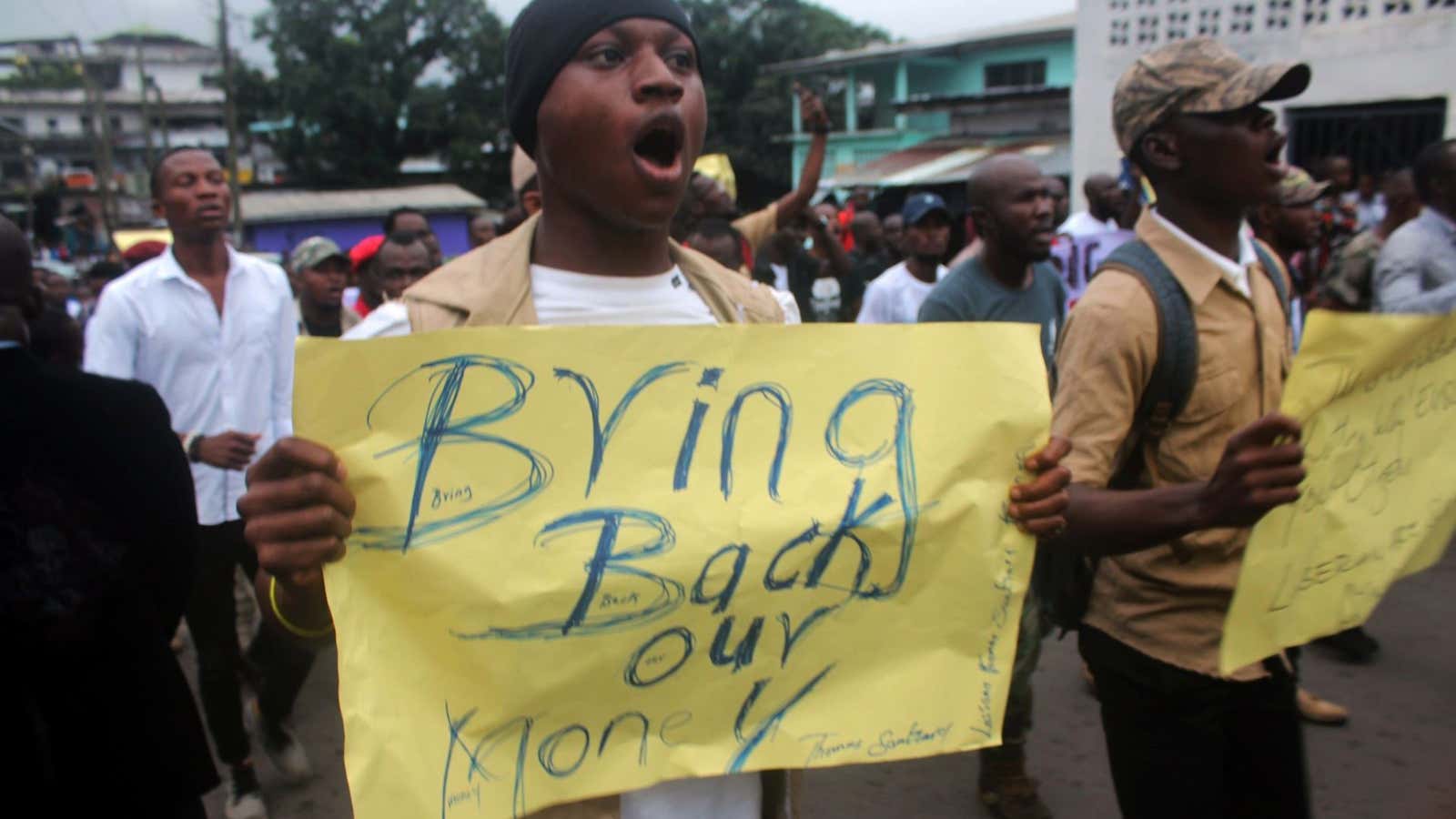It’s a confusing time to be a Liberian. Two weeks ago, the government conceded news reports that $104 million worth of new bank notes, equivalent to 20% of the government’s annual budget, had gone missing in a shipping container at Monrovia ports.
Now the country’s central bank says the notes were never missing at all.
“Records from Crane Currency of Sweden, which was contracted to print the money, show that Crane delivered 15.5 billion Liberian dollars through Freeport and Roberts International Airport between 2016 and 2018,” Nathaniel Patray, the Central Bank of Liberia governor, told a press conference last week. “All these monies were logged by the CBL (Central Bank of Liberia) and delivered into the reserved vaults of the CBL.”
In response Liberia has lifted travel bans on 35 former and current government officials, including Charles Sirleaf, the deputy governor of the central bank and son of former president Ellen Johnson Sirleaf.
The central bank’s new claims lack some credibility because senior security and government officials had ample opportunity to deny claims of missing cash weeks before the story broke, when journalists from Liberia’s Front Page Africa first started making enquiries. Instead, the government publicly accused the previous administration of being responsible.
Two weeks ago, Frank Musah Dean, the country’s justice minister, said the containers and bags of monies allegedly arrived between November 2017, prior to the inauguration of the current government, and August 2018. “Evidence available to the investigative team has established that the current administration was not informed about the arrival of the containers and bags of moneys into the country.”
Former president Sirleaf furiously denounced the accusation. President George Weah launched a special presidential committee made up of representatives from politics and civil society and invited the US FBI to take part.
Adding fuel to the saga, president Weah had ordered the infusion of $25 million into the economy in a bid to curb the rising foreign exchange rate (the Liberian dollar has fallen 20% against the US dollar this year). To date, commercial banks operating in the country have no record of how that money was disbursed or which businesses benefited.
The country has been convulsed by the scandal. Protests have been held in Monrovia and in New York where the president spoke to the UN General Assembly. Talk show radio has given 24/7 coverage of the saga. Liberians go about their days singing “Bring our container back”—a song by enterprising musicians Af04Doe and Skinnyboi Kpanto. Local social media is blanketed with calls to #BringBackOurMoney.
But with the government’s denial weary Liberians, more than half of whom live in poverty, are starting to shrug off yet another scandal. Even one so brazen. Commentators say the government’s denial is a move straight from the playbook of US President Donald Trump: Sow doubt in people’s minds, cast the media that reported the story as untruthful and hope the anger dissipates. If that was the goal, it appears to be working.
“What are we going to do?” asks Mae Azango, a well-known local journalist expressing the frustration felt by many Liberians. “We are just struggling to make ends meet. Those big people have all the power. There’s nothing we can do.”
Like Trump, Weah’s zealous supporters appear unwilling to accept any criticism of their beloved leader.
It’s unlikely that international institutions will forget so easily. The contradictory explanations have made it difficult for international partners to believe any explanation at this point. The US Federal Reserve in New York, responsible for the Central Bank of Liberia’s foreign transfers and payments, has put a hold on all transactions with the Central Bank. Investors have been spooked by the country’s suspension from the Extractives Investment Transparency Initiative and the decision to more than double the country’s debt with loans from two poorly vetted sources. Both loans deals subsequently fell apart.
Experts here warn the scandal may not threaten the Weah government but if economic turmoil is not halted, inflation and hunger will.
*Corrects Frank Musah Dean job title to justice minister from information minister in earlier version of story.
Sign up to the Quartz Africa Weekly Brief here for news and analysis on African business, tech and innovation in your inbox
